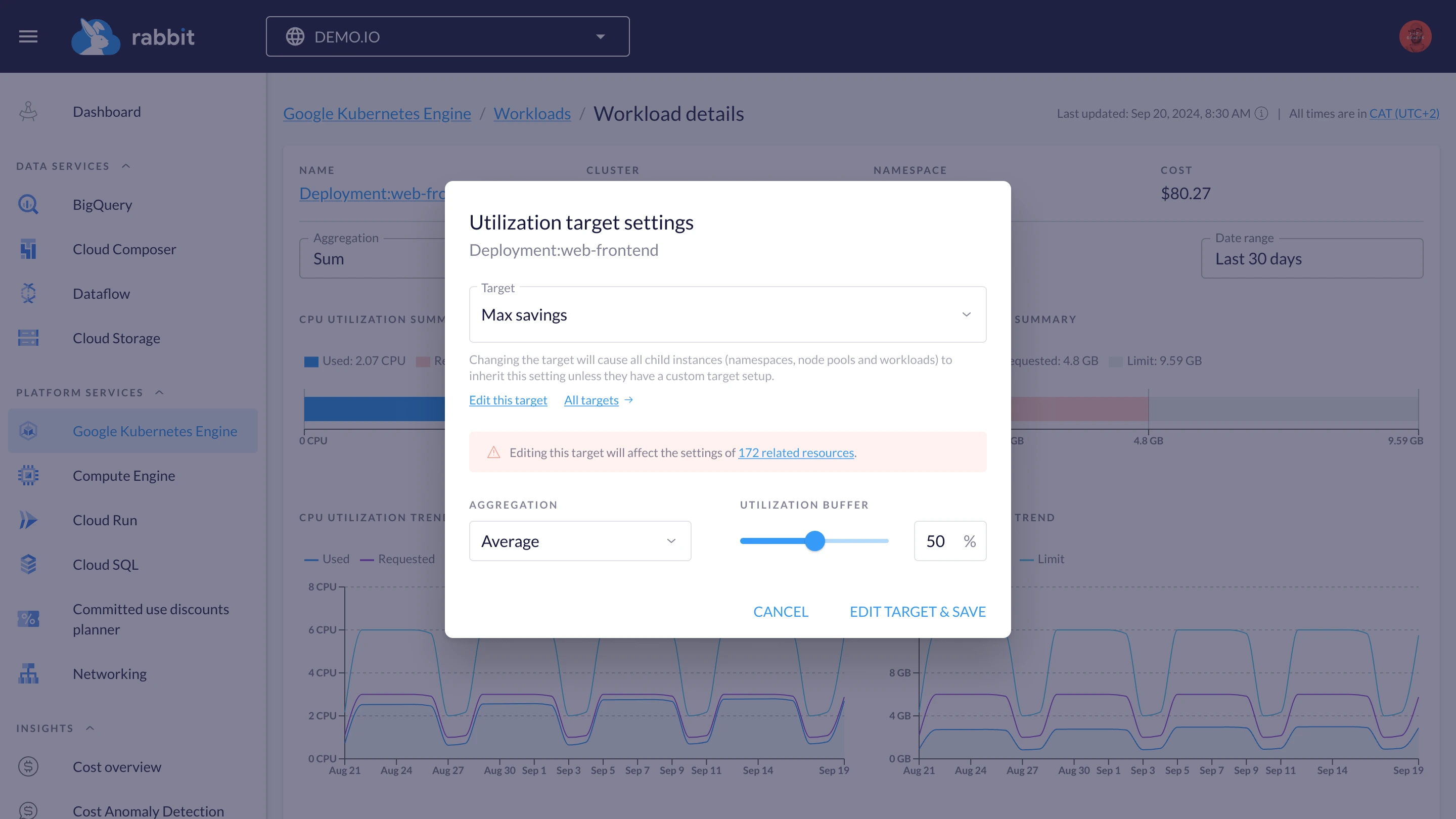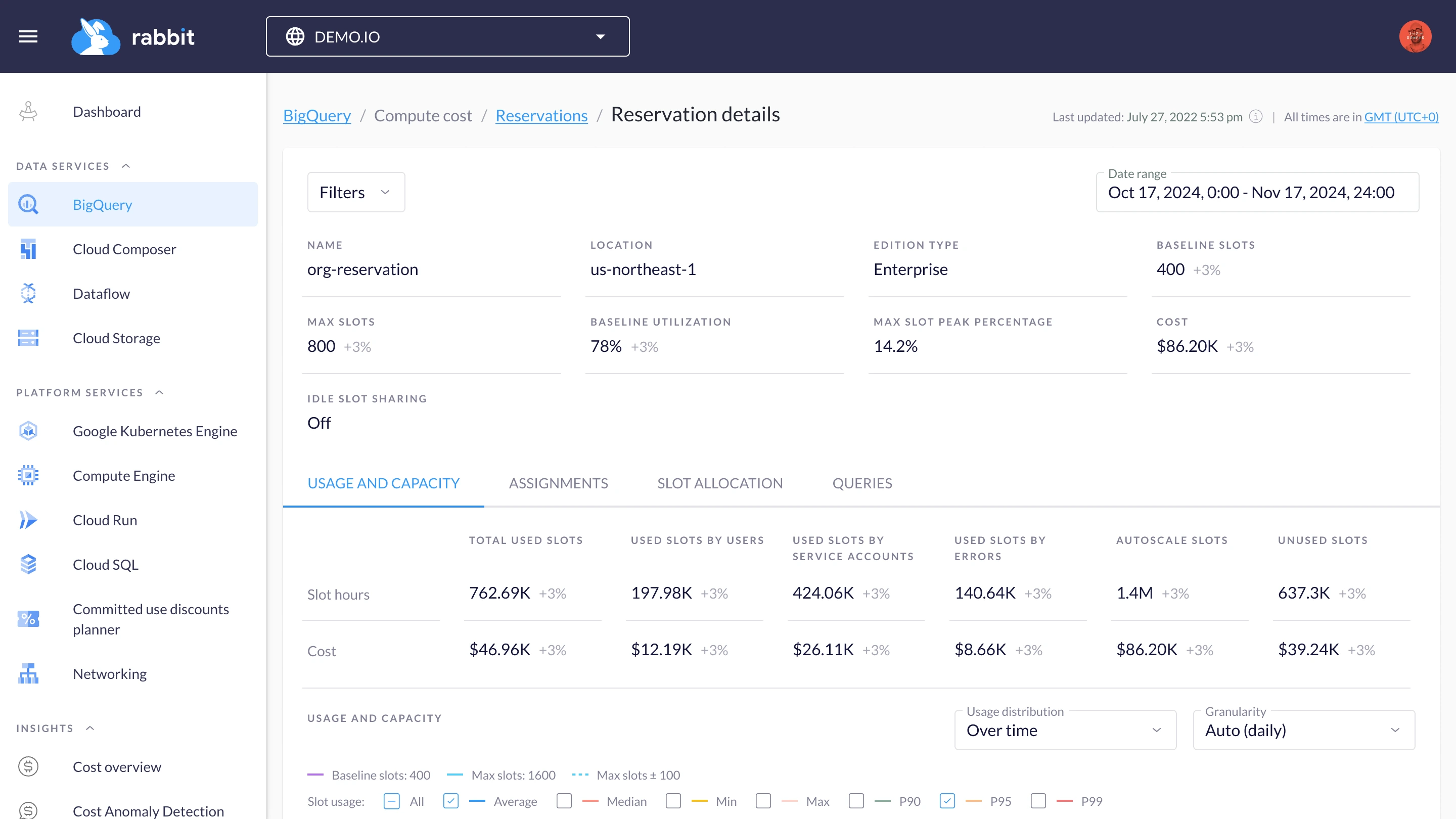Features
PROAutomation
For specialized optimization use cases, Rabbit provides an open-source agent that customers can seamlessly integrate into their environment. This agent accelerates the optimization process and reduces the need for engineers to perform tedious, repetitive tasks.
In Rabbit, automation isn’t a black box. Customers have full control over how recommendations are calculated and where and how they’re applied.
Google Kubernetes Engine (GKE)
In GKE there could be thousands of over-requested Workloads/Pods that can result in resource waste of up to 50%. Optimizing these resources could be challenging, especially for short-running Pods like Spark jobs or Airflow pipelines.
Rabbit accurately tracks the real cost and utilization of Pods with a high sampling rate of 15 seconds, at the level of top-level controllers like Deployments, StatefulSets, or individual Spark and Airflow tasks.
Customers can set utilization targets, such as max usage plus 50%, at various levels like Global, Cluster, Nodepool, Namespace, or even Workload/Pod.
Rabbit offers an agent that automates the application of these recommendations through a Mutating Admission Webhook. Customers retain full control over where to apply these changes by configuring the appropriate matching labels.
BigQuery
With Edition reservations, keeping BigQuery costs under control can be challenging. Setting the maximum slots too high to meet business SLAs for certain jobs can result in potential waste, as the Autoscaler might scale up more aggressively, even when it’s not necessary for less critical jobs.
Rabbit identifies blind spots where available slots exceed the actual needs by jobs.
Customers can tag critical jobs within Rabbit, and a Rabbit agent can automatically adjust the reservation's max slot setting minute by minute, based on historical usage and the importance of these critical jobs. This approach can reduce unused slots by up to 50%.
Cloud Storage
Managing storage class types at the file level can be challenging, especially for large buckets. While GCP’s Autoclass feature is easy to use, it can undermine cost-saving efforts.
For example, if Autoclass is enabled for a bucket that already contains files in the Archive class, it will immediately move those files back to the Standard class, resulting in up to 10 times higher costs. The files will only be moved back to the Archive after a year, negating the potential savings.
Rabbit analyzes actual costs and usage patterns across folders, files, extensions, and even prefix-based groups, giving customers deeper insights into their storage buckets. With the addition of an agent, customers can set up advanced lifecycle rules, such as moving files to Archive if they haven’t been accessed for 30 days and are older than 90 days.
Applying these recommendations won’t lead to unexpected cost spikes, thanks to Rabbit’s interactive planner, which shows the potential savings along with the one-time fee for moving files to a different class type.
Rabbit is available through Google Cloud Marketplace
It counts towards your GCP consumptions and easier to sign-up
Get in touch to start saving
We help businesses save 30-50% on their Google Cloud spending and provide full clarity on their costs.

Zoltán Guth
CTO


'%3e%3cg%3e%3cpath%20d='M116,57C116,40.443%20102.557,27%2086,27C69.443,27%2056,40.443%2056,57C56,73.557%2069.443,87%2086,87C102.557,87%20116,73.557%20116,57Z'%20style='fill:url(%23_Linear1);'/%3e%3cpath%20d='M93.663,63.249L99.207,68.793C99.437,69.022%2099.531,69.336%2099.491,69.634C99.527,69.863%2099.456,70.104%2099.28,70.28C99.104,70.456%2098.863,70.527%2098.634,70.491C98.336,70.531%2098.022,70.437%2097.793,70.207L92.249,64.663C90.158,66.433%2087.454,67.5%2084.5,67.5C77.873,67.5%2072.5,62.127%2072.5,55.5C72.5,48.873%2077.873,43.5%2084.5,43.5C91.127,43.5%2096.5,48.873%2096.5,55.5C96.5,58.454%2095.433,61.158%2093.663,63.249ZM83.5,60.5C83.5,61.052%2083.948,61.5%2084.5,61.5C85.052,61.5%2085.5,61.052%2085.5,60.5L85.5,56.5L89.5,56.5C90.052,56.5%2090.5,56.052%2090.5,55.5C90.5,54.948%2090.052,54.5%2089.5,54.5L85.5,54.5L85.5,50.5C85.5,49.948%2085.052,49.5%2084.5,49.5C83.948,49.5%2083.5,49.948%2083.5,50.5L83.5,54.5L79.5,54.5C78.948,54.5%2078.5,54.948%2078.5,55.5C78.5,56.052%2078.948,56.5%2079.5,56.5L83.5,56.5L83.5,60.5Z'%20style='fill:white;'/%3e%3cpath%20d='M118.515,38.266C121.791,43.968%20123.51,50.431%20123.5,57.007C123.49,63.583%20121.75,70.041%20118.456,75.732C115.162,81.424%20110.43,86.149%20104.733,89.434C99.036,92.719%2092.576,94.448%2086,94.448'%20style='fill:none;fill-rule:nonzero;stroke:rgb(21,22,58);stroke-opacity:0.12;stroke-width:1px;'/%3e%3cpath%20d='M48.5,56.791C48.528,50.235%2050.274,43.801%2053.563,38.13C56.853,32.459%2061.572,27.75%2067.25,24.472'%20style='fill:none;fill-rule:nonzero;stroke:rgb(155,81,224);stroke-opacity:0.8;stroke-width:1px;'/%3e%3c/g%3e%3c/g%3e%3cdefs%3e%3clinearGradient%20id='_Linear1'%20x1='0'%20y1='0'%20x2='1'%20y2='0'%20gradientUnits='userSpaceOnUse'%20gradientTransform='matrix(60,0,0,60,56,86.9629)'%3e%3cstop%20offset='0'%20style='stop-color:rgb(155,81,224);stop-opacity:0.8'/%3e%3cstop%20offset='1'%20style='stop-color:rgb(54,154,248);stop-opacity:1'/%3e%3c/linearGradient%3e%3c/defs%3e%3c/svg%3e)

